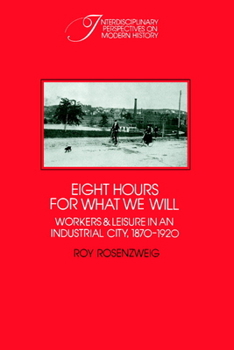Eight Hours for What We Will: Workers and Leisure in an Industrial City, 1870-1920
Select Format
Select Condition 
Book Overview
In the first comprehensive study of American working-class recreation, Professor Rosenzweig takes us to the saloons, the ethnic and church picnics, the parks and playgrounds, the amusement parks, and... This description may be from another edition of this product.
Format:Paperback
Language:English
ISBN:052131397X
ISBN13:9780521313971
Release Date:October 1985
Publisher:Cambridge University Press
Length:320 Pages
Weight:1.15 lbs.
Dimensions:0.9" x 6.0" x 9.0"
Customer Reviews
1 rating
Leisure Among the Working Class
Published by Thriftbooks.com User , 22 years ago
It is interesting how the focus of leisure has changed among social historians to include elements of working-class leisure. In Eight Hours for What We Will: Workers & Leisure in an Industrial City, 1870-1920 by Roy Rosenzweig. Rosenzweig first offers theories as to why labor historians have traditionally shied away from studying leisure as an academic subject, citing the silliness and frivolity old-fashioned academics associate with the subject. After referring to these types of intellectuals as "narrow-minded,' Rozenzweig continues to use the town of Worcester, Massachusetts to discover what constituted pastimes and amusement for Worcester workers by asking three questions. The first asks what have been the traditional values among the American working class, the second asks about the character of interclass relations in America's industrial communities, and the third question asks how class culture and relations changed from the nineteenth century to the twentieth. By examining these questions, Rosenzweig believes that a town like Worcester "offers the best opportunity for capturing workers' lives in all their complexity." (Rosenzweig, 3) The first two sections of Eight Hours for What We Will are concerned with the saloon and the effect of temperance on workers as well as the use of July Fourth celebrations "to mark out [Worcester's immigrants'] cultural distance not only from the city's elite and native middle class but also from fellow immigrants. (Rosenzweig, 65-86) Eventually, Rosenzweig writes about how interrelationships of workers led to the rise of a leisure market, an outgrowth of both the saloon and Fourth of July celebrations. One of Rosenzweig's main arguments is that the development of amusement park, continual importance of saloons as leisure arenas, and the beginning of a film culture were all a gradual process that grew with the Worcester community itself. Less a study on the nature of leisure, Rosenzweig effectively indicates how leisure is transformed within the bounds of a working class community.




